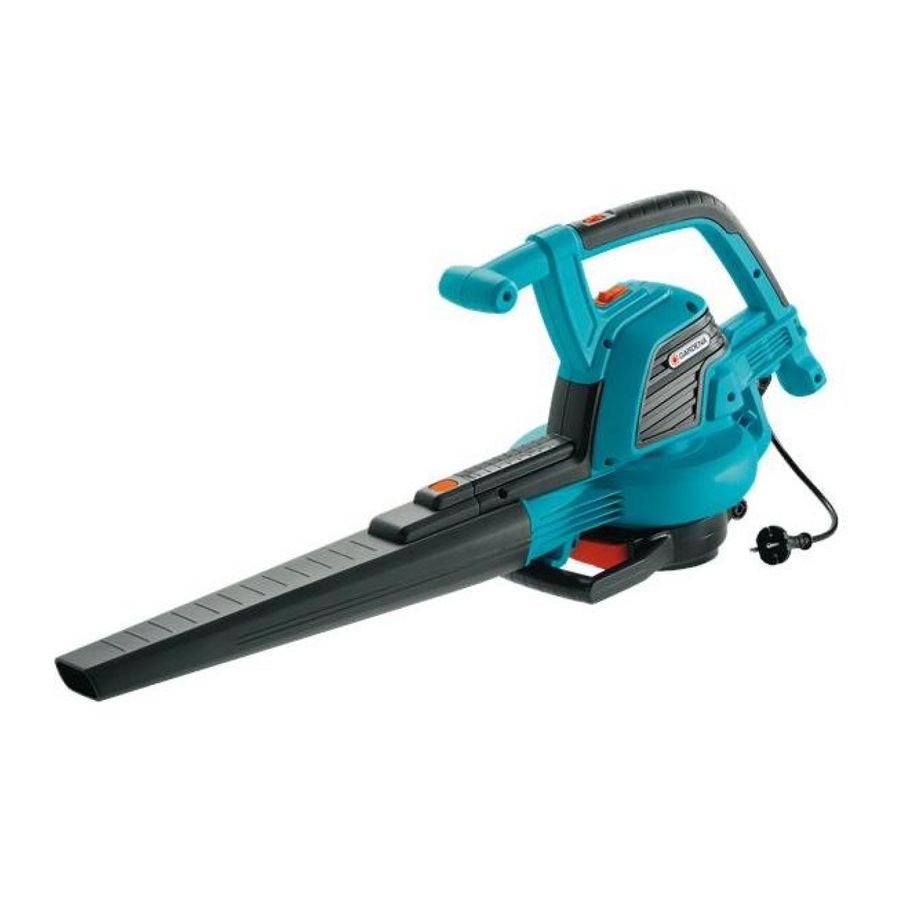of parts and any other condition that may
affect the power tool's operation. If damaged,
have the power tool repaired before use.
Keep all cooling air inlets clear of debris.
Many accidents are caused by poorly maintained
power tools.
g) Use the power tool and accessories in
accordance with these instructions, taking
into account the working conditions and the
work to be performed. Use the product only
in daylight or good artificial light.
Use of the power tool for operations different
from those intended could result in a hazardous
situation.
5) Maintenance and storage
Have your power tool serviced by a qualified
repair person using only identical replace-
ment parts.
This will ensure that the safety of the power tool
is maintained.
– Keep all nuts, bolts and screws tight to be sure
the product is in a safe working condition.
– Replace worn or damaged parts for safety.
– Use only genuine replacement parts and
accessories.
– Inspect the debris bag regularly. If the debris
bag becomes worn or damaged, replace.
– Store in a cool dry place and out of reach of
children. Do not store outdoors.
Blower safety warnings
• Inspect the area before using the unit.
Remove all debris and hard objects such
as rocks, glass, wire, etc., that can ricochet,
be thrown, or otherwise cause injury or
damage during operation.
• Never run the unit without the proper
equipment attached. When used as a blower,
always install a blower tube. Use only recom-
mended attachments to prevent personal injury.
• Do not use blower near leaf or brush fires,
fireplaces, barbecue pits, ashtrays, etc.
Proper use of the blower will help avoid
spreading fire.
• Never place objects inside the blower
tubes; always direct the blowing debris
away from people, animals, glass, and
solid objects such as trees, automobiles,
walls, etc.
The force of air can cause rocks, dirt, or sticks
to be thrown or to ricochet which can hurt
people or animals, break glass, or cause other
damage.
• Never use for spreading chemicals,
fertil izers, or any other substances.
This will prevent the spreading of toxic
materials.
Vacuum safety warnings
• Stop the motor and disconnect the exten-
sion cord before opening the air inlet
door or attempting to insert or remove the
vacuum tubes. The motor must be stopped
and the impeller blades no longer turning to
avoid serious injury from the rotating blades.
• Inspect the area before using the unit.
Hard objects can be thrown through the
collection bag or the housing and become
dangerous missiles which can cause
serious injury to the operator or others.
• Do not vacuum stones, gravel, metal,
broken glass, etc.
Proper use of the unit will reduce possible
personal injury and/or damage to the unit.
• Do not attempt to vacuum water or other
liquids. Water or other liquids entering a power
tool will increase the risk of electric shock.
• Never run the unit without the proper
equipment attached.
When used as a vacuum, always install vacuum
tubes and collection bag assembly. Make sure
the collection bag assembly is completely
zipped when unit is running to avoid flying
debris. Use only recommended attachments.
• Do not vacuum discarded matches, cigars,
cigarettes, or ash from fireplaces, barbecue
pits, brush piles, etc.
Avoid situations which could set the collection
bag on fire. To avoid spreading fire, do not use
blower near leaf or brush fires, fireplaces,
barbecue pits, ashtrays, etc.
• Always use the shoulder strap when
vacuuming. This will help maintain control of
the power tool.
• Check air intake openings, elbow tube,
and vacuum tubes frequently, always with
the unit stopped and the power source
disconnected. Keep vents and tubes free of
debris which can accumulate and restrict
proper air flow. Do not use with any opening
blocked. Keep free of dust, lint, hair and
anything that may reduce air flow.
Additional Safety Recommendations
Danger! Small parts could be swallowed during
assembly and there is a risk of suffocation from
the polybag. Keep infants away during assembly.
Warning! This machine produces an electro-
magnetical field during operation. This field may
under some circumstances interfere with active
or passive medical implants. To reduce the risk
of serious or fatal injury, we recommend persons
with medical implants to consult their physician
and the medical implant manu facturer before
operating this machine.
19

